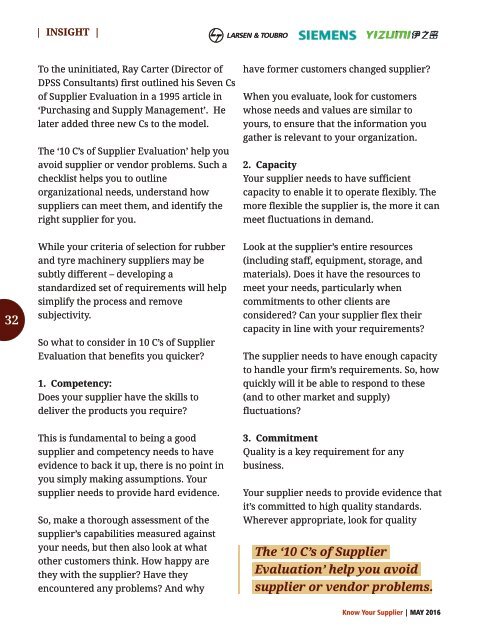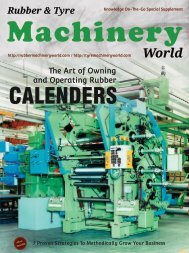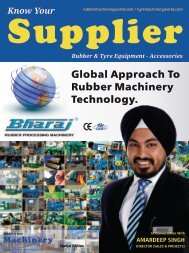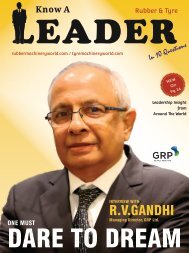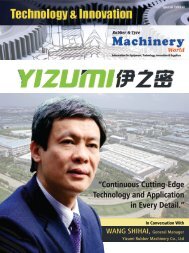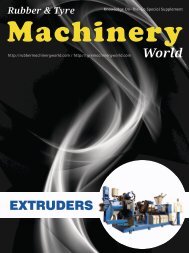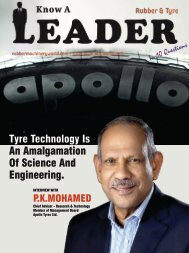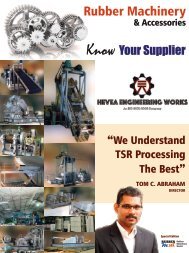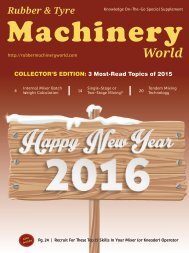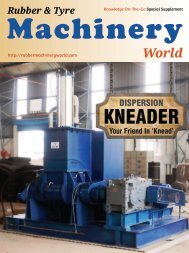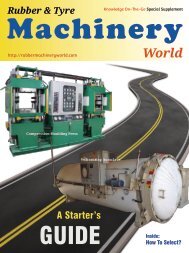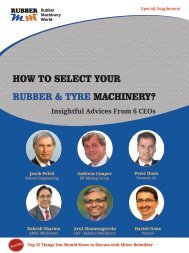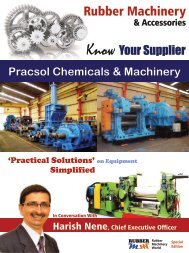Know Your Supplier - Rubber & Tyre Machinery World May 2016 Special
Sustaining & innovating amidst changes is the hallmark of exemplary leadership. Pelmar Group has been displaying this leadership for the last 50 years! In this special edition, we showcase for you Pelmar Eng Ltd and two other knowledge enhancing articles
Sustaining & innovating amidst changes is the hallmark of exemplary leadership. Pelmar Group has been displaying this leadership for the last 50 years! In this special edition, we showcase for you Pelmar Eng Ltd and two other knowledge enhancing articles
You also want an ePaper? Increase the reach of your titles
YUMPU automatically turns print PDFs into web optimized ePapers that Google loves.
| INSIGHT |<br />
To the uninitiated, Ray Carter (Director of<br />
DPSS Consultants) first outlined his Seven Cs<br />
of <strong>Supplier</strong> Evaluation in a 1995 article in<br />
‘Purchasing and Supply Management’. He<br />
later added three new Cs to the model.<br />
The ‘10 C’s of <strong>Supplier</strong> Evaluation’ help you<br />
avoid supplier or vendor problems. Such a<br />
checklist helps you to outline<br />
organizational needs, understand how<br />
suppliers can meet them, and identify the<br />
right supplier for you.<br />
have former customers changed supplier?<br />
When you evaluate, look for customers<br />
whose needs and values are similar to<br />
yours, to ensure that the information you<br />
gather is relevant to your organization.<br />
2. Capacity<br />
<strong>Your</strong> supplier needs to have sufficient<br />
capacity to enable it to operate flexibly. The<br />
more flexible the supplier is, the more it can<br />
meet fluctuations in demand.<br />
32<br />
While your criteria of selection for rubber<br />
and tyre machinery suppliers may be<br />
subtly different – developing a<br />
standardized set of requirements will help<br />
simplify the process and remove<br />
subjectivity.<br />
So what to consider in 10 C’s of <strong>Supplier</strong><br />
Evaluation that benefits you quicker?<br />
1. Competency:<br />
Does your supplier have the skills to<br />
deliver the products you require?<br />
Look at the supplier’s entire resources<br />
(including staff, equipment, storage, and<br />
materials). Does it have the resources to<br />
meet your needs, particularly when<br />
commitments to other clients are<br />
considered? Can your supplier flex their<br />
capacity in line with your requirements?<br />
The supplier needs to have enough capacity<br />
to handle your firm’s requirements. So, how<br />
quickly will it be able to respond to these<br />
(and to other market and supply)<br />
fluctuations?<br />
This is fundamental to being a good<br />
supplier and competency needs to have<br />
evidence to back it up, there is no point in<br />
you simply making assumptions. <strong>Your</strong><br />
supplier needs to provide hard evidence.<br />
So, make a thorough assessment of the<br />
supplier’s capabilities measured against<br />
your needs, but then also look at what<br />
other customers think. How happy are<br />
they with the supplier? Have they<br />
encountered any problems? And why<br />
3. Commitment<br />
Quality is a key requirement for any<br />
business.<br />
<strong>Your</strong> supplier needs to provide evidence that<br />
it’s committed to high quality standards.<br />
Wherever appropriate, look for quality<br />
The ‘10 C’s of <strong>Supplier</strong><br />
Evaluation’ help you avoid<br />
supplier or vendor problems.<br />
<strong>Know</strong> <strong>Your</strong> <strong>Supplier</strong> | MAY <strong>2016</strong>


